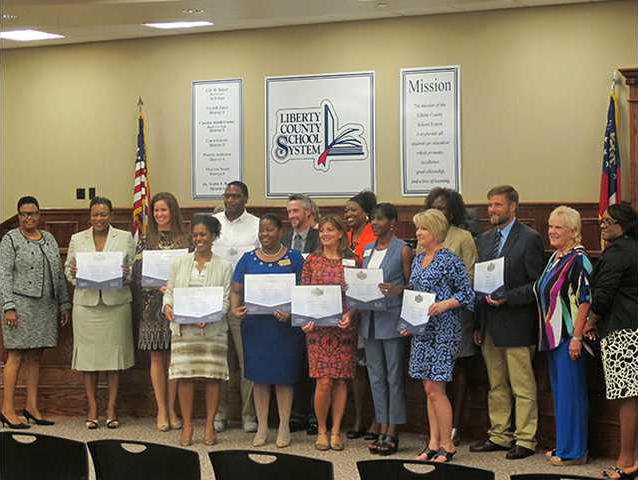If you see a group of students hanging around a parked bus, don’t worry. They might just be doing homework.
The bus Wi-Fi initiative to provide internet access to students who do not have it at home was approved by the Liberty County Board of Education Tuesday.
Twenty-four buses, 14 in Hinesville, five in the east end and five in west Liberty County, will be parked with hotspots that Liberty County School System students will be able to access with their iPads.
Board of education members discussed the initiative at their July 26 meeting and approved the program Tuesday after more discussions.
Private property owners have given the school system the "OK" to park buses on their
property, district chief financial officer Roger Reese said.
Board member Carolyn Smith Carter, who said she is excited about the initiative, was concerned about the safety of students who will gather near or around the bus — especially high-school students who are more likely to be alone outside.
Superintendent Dr. Valya Lee said parents will have to monitor their children.
"We’re just providing access and making sure our iPads have those filters and those firewalls, so that nothing that would be inappropriate at school can get to them at home. But in terms of who is watching my kids, you (the parents) are," Lee said.
Fort Stewart Garrison Commander Col. Townley Hedrick, who occasionally sits with board members during meetings to provide feedback but does not vote, said he gets a little apprehensive when it seems that learning is more reliant on the internet. Hedrick asked if the school system is completely moving away from textbooks.
Lee told him that the district uses digital textbooks, applications and books in the media centers to give students more resources for learning and give teachers different avenues to teach. She emphasized that the hotspots will help with personalized learning at home.
Lee reiterated that the initiative is a stopgap measure.
"What we have is approximately 60 percent of our students who do not have Wi-Fi, so this may afford only another 20 percent Wi-Fi, but that 20 percent is better than none," Lee said. "We cannot afford right now to put a hotspot in every home."
Bus hotspots will cost $82,302 annually and is funded through the Educational Special Purpose Local Options Sales Tax.
Parents will be given information on where the buses are parked, other places that provide free Wi-Fi and are encouraged to remain alert while their student is accessing the hotspot.
Georgia Milestone
Assessment System tests
Assistant Superintendent Susan Avant presented the Georgia Milestones Assessment System results from the spring semester, when parents and school administrators expressed worried about technical difficulties negatively affecting test scores.
The testing company Data Recognition Corporation’s application, which ran on electronic devices, and its server slowed down because of the volume of students taking the test at once. This caused some students to restart their test or wait for the application to run correctly.
Compared to spring 2015 results, the district saw gains in several content areas, in spite of the glitches. Bradwell Institute and Liberty County High School had gains in five out of eight content areas such as physical science, math and American literature. Elementary and middle school scores at level 3, proficient learners and level 4 distinguished learners, went up in 80 content areas with 26 areas seeing double digit gains.
Those in the audience at the board meeting applauded the news.
"That’s good news, when we talk about student achievement, to see our scores go up," BOE Chairwoman Lily Baker said. "Though there’s always room for improvement, to see our test scores go up and in some areas are double digit gains, that is what we consider good news."
Baker then thanked Dr. Lee, faculty and staff for their work.
BOE member Carol Guyett asked if there is a way to determine how the technical difficulties affected test scores. Avant said she was unable to provide that information.
In other business the board approved the use of Canvas K-12, web-based software that will act as a central area for student and teacher content. The system will be able to track student performance, assign curriculum and perform student assessments. Canvas K-12 will be able to interface with PowerSchool, a data collection system the district currently uses to keep information on all students and provide information for state reporting. Patti Crane, district chief information officer said, a committee consisting of academic specialists, teachers and school administrators choose Canvas K-12 out of their top three choices.
The system will cost $161,000 for a three-year subscription paid with charter funds.
Representatives from each school received certificates in honor of the district receiving accreditation.
As of Aug. 9, LCSS student enrollment was 9,958.

